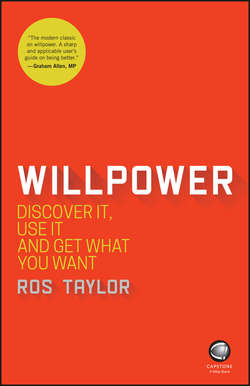Читать книгу Willpower - Taylor Ros - Страница 9
На сайте Литреса книга снята с продажи.
PART ONE
The Essence of Willpower
WILLPOWER RESEARCH
Оглавление“If only I had more willpower” is a cry heard often in the face of a diet jettisoned, smoking restarted or any short-term pleasure pursued to the detriment of future gain. Is willpower an innate capability – something we just have or haven’t – or is it something we can learn? I strongly believe the latter and yet those with great self-control often believe it is innate. They seem to feel as if they have always had it. Innate or learned, whichever you believe, willpower is certainly important.
The results of the American Psychological Association’s annual Stress in America survey in 2011 revealed that 27 % of participants cited a lack of willpower as the major reason they couldn’t make healthy lifestyle changes.
In 2005, University of Pennsylvania psychologists Angela Duckworth and Martin Seligman explored self-control in school children over the course of a school year. The researchers first gauged the students’ self-discipline (willpower) by having teachers, parents and the students themselves rate their behaviour.
They also gave students a task in which they had the option of receiving $1 immediately or waiting a week to receive $2. They found students who ranked high on self-discipline had better grades, better school attendance and were more likely to be admitted to a good high school. The clincher of the study was that willpower was more important than intelligence in predicting academic success. Wow.
Other studies have produced similar results. In 2004, June Tangney of George Mason University asked undergraduate students to complete self-control measures. They found that high self-control scores correlated with higher grade point averages, higher self-esteem, less binge-eating and alcohol abuse, and.. would you believe it.. better relationship skills. So a bit of self-control when providing feedback to your “other half” is fervently desired!
The benefits of willpower seem to extend well beyond school, college or university years. Terrie Moffitt of Duke University published results in 2011 about self-control in a group of 1000 individuals who were tracked from birth to 32 as part of a long-term health study in New Zealand. She and her colleagues found those with high self-control in childhood (as reported by teachers, parents and the children themselves) grew into adults with greater physical and mental health, fewer substance abuse problems and criminal convictions, better savings behaviour and greater financial security. Those patterns were nothing to do with family socio-economic status or, indeed, intelligence.
So willpower has huge general importance in nearly all areas of life.
Definition 1 Willpower is the ability to resist short-term temptations in order to meet long-term goals.
Before bringing things up to date, we first have to return to 1989 when Walter Mischel’s research began. Mischel, a psychologist from Columbia University, explored self-control in children using the now famous “marshmallow test” and laid the groundwork for our understanding of self-control.
Young children were presented with a plate of marshmallows and invited to eat one. They were then told that the researcher would leave the room for a few minutes and if they waited until the researcher returned, they could eat two marshmallows. If the child couldn’t wait for the returning researcher, they could ring a bell and the researcher would return but with no second marshmallow on offer.
The children with good self-control gave up the immediate pleasure of one in order to eat two at some later stage. Dieters resist chocolate cake so they can become more streamlined. Shoppers resist splurging at the mall so they can save for a comfortable retirement. All examples of resistance.
Actions for Willpower
• Remind yourself of the advantages of resistance. Write them down somewhere noticeable.
• Imagine the positive outcome. More money in the bank, a thinner you, two marshmallows not one.
• Distraction works. Look away from temptation. Do something else, anything else, just not what you want to avoid.
Mischel then proposed what he calls a “hot/cool” system to explain why willpower succeeds or fails. The cool system is cognitive and rational. It’s a thinking system with knowledge about the impact of your choice with thoughts, feelings and actions all designed to remind you why you should leave the marshmallow where it belongs. While the cool system is relaxed, the hot system is impulsive and emotional. It is responsible for quick, knee-jerk responses to certain triggers, such as eating the marshmallow (and possibly the rest of the plate) immediately without thinking of the long-term implications.
When willpower fails, exposure to a “hot” stimulus essentially overrides the cool system, leading to impulsive actions. Some people, it seems, may be more or less susceptible to hot triggers. And that susceptibility to emotional responses may influence their behaviour throughout life, as Mischel discovered when he revisited his marshmallow-test subjects as adolescents. He found that teenagers who had waited longer for the marshmallows as young children were more likely to score higher on exams, and their parents were more likely to rate them as having a greater planning ability, handling stress well, showing self-control in frustrating situations and concentrating without becoming distracted.
Конец ознакомительного фрагмента. Купить книгу
